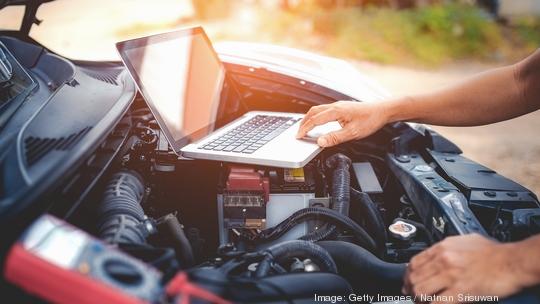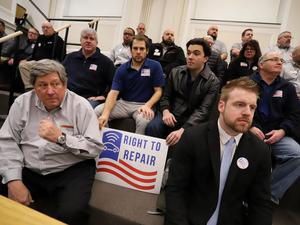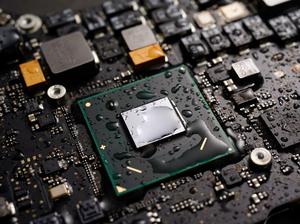
After months of often-fraught campaigning and a record $43 million spent, Massachusetts Question 1, an update to the state’s so-called “right to repair” law, has passed.
As of Wednesday afternoon, the Yes on 1 campaign had garnered 75 percent of votes — nearly 2.5 million — with 97 percent of precincts reporting.
Question 1 requires automotive manufacturers that sell vehicles with wireless telematics systems in Massachusetts to equip them with a standardized open data platform starting with 2022 models. The platform would enable mechanics and owners to access mechanical data about a vehicle via a mobile app, as well as send commands to the vehicle itself.
The measure was designed to fix a loophole created by the state’s original right-to-repair measure, which voters approved in 2012 and became law in 2013. At that time, cars that transmitted mechanical information wirelessly were exempt from the law, but today, most new cars are built with telematics systems. Telematics is itself a broad term; Question 1 defines telematics systems as all “systems that collect and wirelessly transmit mechanical data to a remote server.”
In an emotional campaign battle, the Right to Repair/Yes on 1 side argued that independent mechanics needed wider access to that data or they would lose business to dealerships and chains. The opposing side, the Coalition for Safe and Secure Data, meanwhile, maintained that opening up the wireless data would pose a major risk to drivers’ personal security.
Those security concerns are not without basis. Taking the measure as written, auto manufacturers will need to implement the “standardized open data platform” with relative speed: 2022 builds will go into production in a matter of months. That worries Bryan Reimer, associate director of the New England University Transportation Center at MIT, who has been a vocal opponent of Question 1.
“A standardized interface, to ‘create an industry standard,’ would take several years. Who’s responsible for it now?” Reimer said. “You’re not just talking Ford and GM in the U.S. You’re talking about German manufacturers, Chinese manufacturers. The Legislature is now in a position where, no matter which way they turn, something’s not going to work.”
Reimer isn’t alone in these concerns. Back in July, the National Highway Traffic Safety Administration, which is generally responsible for writing motor vehicle safety requirements at the federal level, penned a letter to the Massachusetts Joint Committee on Consumer Protection and Professional Licensure arguing that the terms of Question 1 “would prohibit manufacturers from complying with both existing federal guidance and cybersecurity hygiene best practices.”
The agency goes on to write that any cars with telematics systems would be highly susceptible to ransomware attacks, given that fleets of cars on the same network could all be attacked from a single source.
“Given the multi-year automotive product development cycle, the deadline for compliance appears impossible for manufacturers to meet in a responsible manner, risking removal of existing cybersecurity controls over wireless access into vehicles as the ballot initiative directs, which increases the risk of cybersecurity attacks that could jeopardize public safety,” NHTSA writes. “Further, the requirement to establish universal and standardized access requirements increases the scale of risks of any potentially successful cybersecurity attack.”
It is possible that the Massachusetts Legislature will step in to delay the implementation of the ballot measure, as it did in 2016 after Bay State voters approved the legalization of recreational marijuana. A bill signed into law on New Year’s Eve that year delayed the opening of pot shops in Massachusetts until mid-2018, nearly two years after voters approved the measure.
BostInno reached out to Massachusetts Senate President Karen Spilka and House Speaker Robert DeLeo for comment, but has yet to hear back.
As for Reimer, he believes that the cost of implementing Question 1 will ultimately come back to hurt Massachusetts. He lamented the lack of national leadership on right-to-repair legislation, although he does believe such measures will one day be handled federally.
Congress stepped into those waters just a few months ago when Democratic New York Rep. Yvette Clark introduced the “Critical Medical Infrastructure Right-to-Repair Act of 2020,” which would protect owners from prosecution if they made a copy of service parts or broke a digital lock while repairing equipment, allow users to make substitute parts and require manufacturers to provide owners access to information and tools to repair equipment. It was the first time national politicians had considered any right-to-repair laws. (The bill was referred to the Committee on the Judiciary as well as the Committee on Energy and Commerce and has not progressed.)
“I am very sympathetic to the need for an honest and truthful discussion around the right to connected vehicles,” Reimer said. “It has to be debated. We’re changing what the makeup of a vehicle looks like, and with change comes new opportunities and challenges that must be discussed and faced as a nation.”







